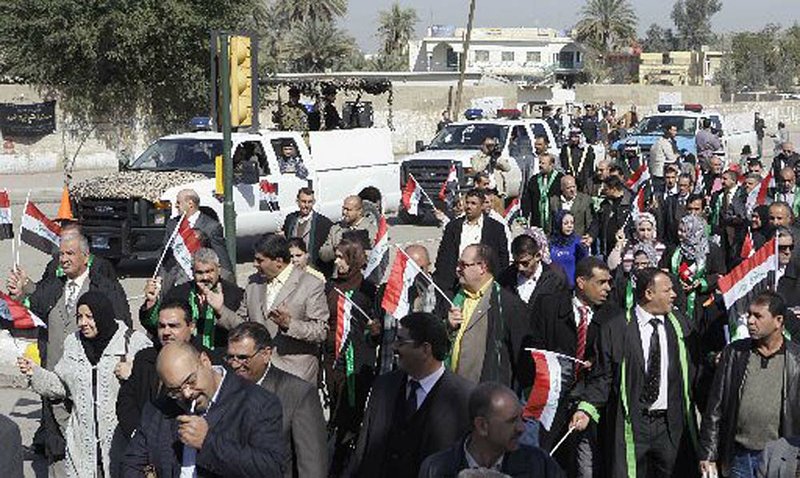BAGHDAD — Iraqi lawyers called for the end of judicial corruption and prisoner abuse in a protest Thursday that was one of the biggest anti-government demonstrations in Iraq since the start of popular uprisings in Egypt and Tunisia.
Also Thursday, a car bomb killed eight pilgrims on the road to one of Iraq’s holiest Shiite shrines, a highly sensitive site still being rebuilt after a 2006 attack that sheared off its gleaming golden dome and engulfed the country in years of sectarian bloodshed.
Dressed in the black cloaks they wear in court, Iraqi lawyers led a peaceful crowd of about 3,000 through a Sunni Muslim neighborhood in western Baghdad, where there is simmering resentment against the Shiite-led government.
Lawyers in the cities of Basra and Mosul also held similar but smaller demonstrations, demanding better jobs and electricity services in Iraqi homes.
“This is in solidarity with the Iraqi people,” said Kadhim al-Zubaidi, spokesman for Iraq’s lawyers’ union in Baghdad. “We want the government to sack the corrupt judges.”
Noting recent reports by human-rights groups revealing secret prisons in Iraq, al-Zubaidi added: “We also demand that the Interior and Defense ministries allow us to enter the secret prisons. We want to get information about these prisons.”
This month, Human Rights Watch reported evidence of prisoners being held at a secret jail in northwestern Baghdad within a military base called Camp Justice. The group said the prisoners were moved there in November, days before an international inspection team was to examine conditions at the detainees’ previous location. Senior Justice Ministry official Busho Ibrahim denied the report.
In Basra, lawyers waved banners declaring, “We demand the respect of the constitution and the Iraqi laws,” and “Lawyers demand the sacking of corrupt blackmailers of the people.” About 200 joined the protest in the southern port city, 340 miles southeast of Baghdad.
Lawyers in Mosul, 225 miles northwest of Baghdad, staged a sit-in the Nineveh provincial court.
Thursday’s car bomb victims included women and children. The group of pilgrims were headed to a shrine in Samarra for today’s ceremonies marking the death of Shiite Islam’s 11th imam, a ninth-century successor to the Prophet Muhammad.
The al-Askari mosque became the epicenter of Iraq’s worst violence. Sunni insurgents wearing uniforms set off two bombs in February 2006 that destroyed the site in a provocation that unleashed Shiite militiamen, who hunted down Sunni clerics and attacked mosques in retaliation - the beginning of years of intensified bloodletting in Iraq.
Thursday’s attack took place about 10 miles away on a road to the shrine from the town of Dujail.
The blast killed eight and wounded more than 40 people, said Dujail’s mayor, Amir Marhoun.
The Samarra shrine, about 60 miles north of Baghdad, is still under reconstruction. Itsdome has been rebuilt, but it’s not yet wrapped in gold.
Information for this article was contributed by Sameer N. Yacoub and Lara Jakes of The Associated Press.
Front Section, Pages 5 on 02/11/2011
